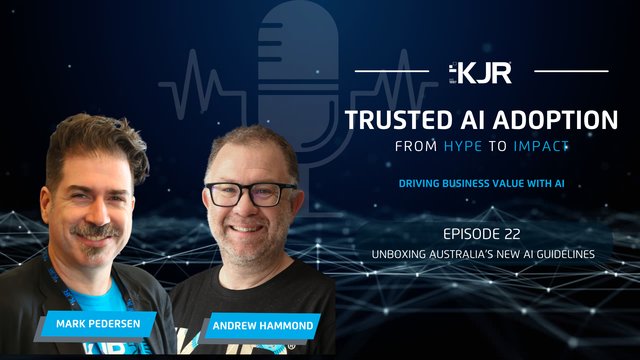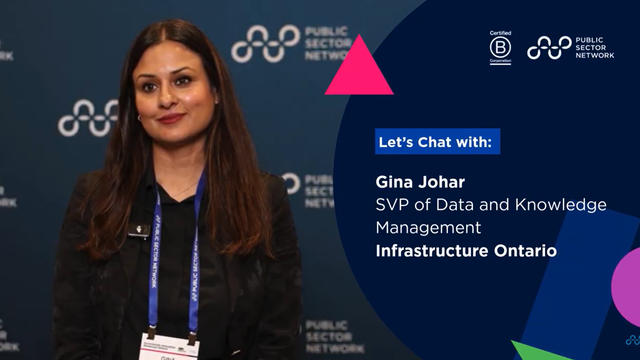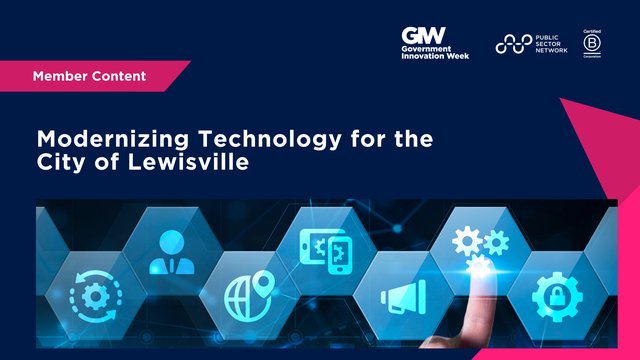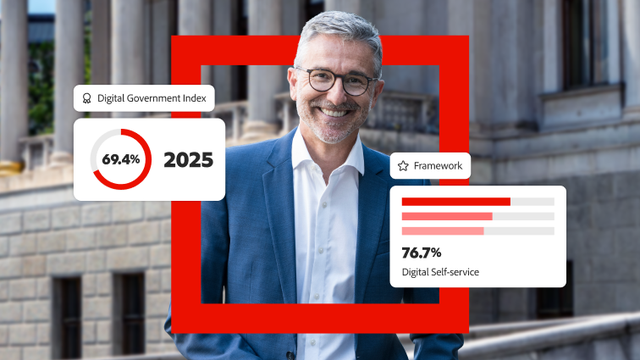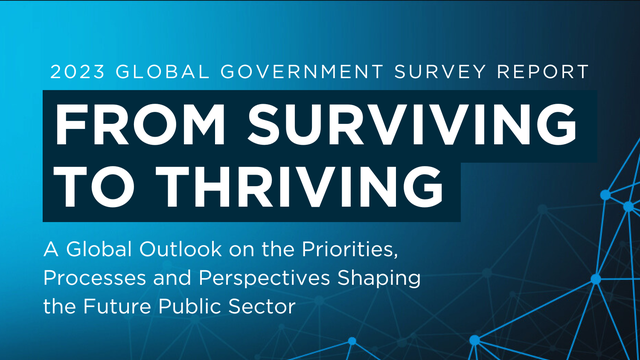
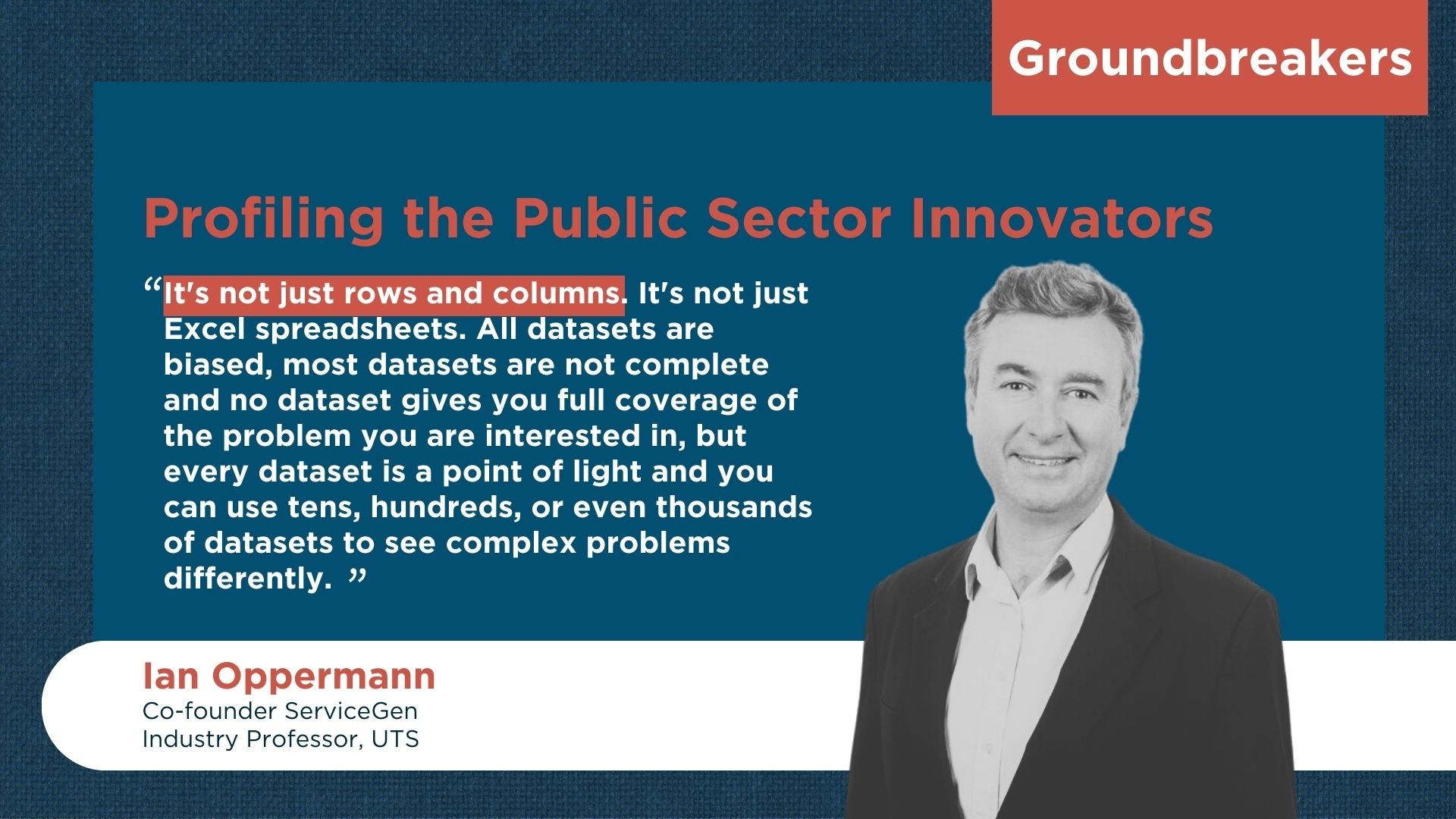
Whether it’s leading the research into cellular and short-range communications or tackling WICKED challenges through the lens of data science for NSW Treasury, data has been the north-star guiding Ian Oppermann’s career. He’s worked alongside astronomers at the CSIRO and he’s helped shepherd data usage across NSW state government. When he first entered the workforce in 1992, the way data was treated was entirely different to its use now. Back then, you needed a doctorate in physics to optimise communications networks.
Ian is an Industry Professor at UTS, and his co-authored papers on computer science have been cited more than 3500 times. He has spent the last ten years shaping the way people think about data and making sense of what can be done with it.
We sat down with Ian to discuss the rise of AI, the power of data to change the world and how it’s changing the public sector for the better.
Jordan Mullins, Head of Editorial, PSN: Ian, would you say your career path was conventional?
Ian Oppermann, Co-Founder, ServiceGen: Definitely not. I began my career working on store-and-forward fax systems. That was so dull, I went back to university to do a PhD in mobile communications. That was an eye opener. In telecoms, data is the product – it is what the network is all about. This experience fundamentally changed my thinking about data and what is means to view the world through the lens of data, then “understand” the world through the lens of AI and machine learning. When I joined CSIRO as Chief of the ICT Division, I had the opportunity to work with the astronomers at CSIRO who really get data, and build mind-blowingly massive telescopes to give them a digital picture of deep space. Then in 2015, I entered the NSW government as the first ever Chief Data Scientist, which was actually a pretty natural extension of my previous experience. Suddenly, I was pointed towards wicked policy challenges and problems that are subtle and complex and ultimately have people's behavior at their heart. For 8 1/2 years until the end of 2023, I’ve been helping government think differently about data. In my time with the public sector, I have looked at transport optimization, fire and rescue response times, domestic and family violence, children at risk of significant harm. In all cases, data makes a difference to how you understand the challenge and the complexity of the challenge.
When did you realize data had the power to change the world?
I started out in the world of telecommunications, and I worked on something called 3G Mobile Communications, which is the same thing we're planning to switch off this year. It makes me feel terribly old, but I actually started working on 3G before it was 3G. Working at Nokia Networks in Finland, I had the responsibility for network optimization tools. This included tools for planning and optimizing networks around the world. We created virtual digital models of networks and were building tools that literally required a PhD to use. It was all based on physics and radio propagation. Over time as 3G came and then more complex systems arrived, and with the beginnings of 4G, we realized that we didn't just have the physics or the equations to analyze and optimize the networks. Data was a way to understand something as complex as a deployed mobile network operating across a whole country with millions of users.
We realized that data was literally a way of seeing the world anew.
What’s the biggest misconception that people have about data?
It's not just rows and columns. It's not just Excel spreadsheets. All datasets are biased, most datasets are not complete and no dataset gives you full coverage of the problem you are interested in, but every dataset is a point of light and you can use tens, hundreds, or even thousands of datasets to see complex problems differently. A lot of people think they can take an Excel spreadsheet, pop up a chart and say “there you go, an insight”. Data is not always something you can throw together and generate some insights from. You certainly can, but that is both the joy and the challenge of it.
If you're planning to use data for something important, you must go to the trouble of understanding where the data came from, how it was collected, and whether it's fit for the purpose you want to use it for.
When you create an insight, a report, a chart, an alert, an alarm, a decision, an action - any data product- you must put in place guidance restrictions or, in some cases, prohibitions about how that data product can be used.
In practice, the care and the craft of pulling data together and then understanding if it's fit for the purpose you want to use it for gives the power to the data analytics or even uses of AI, which otherwise can be very readily dismissed.
How do you get people to focus on the fundamentals and the craft of good data management and application?
The public sector deals with far more sensitive and critical information than the average corporate entity. As the public sector starts using data and AI for those important use cases, it’s crucial to demonstrate context, domain expertise, technical expertise and government expertise.
You can discover a lot of interesting things with data and AI, without a lot of skill or experience, but you can’t do anything important with data unless you do that foundational work.
Ultimately, I encourage everyone to get started, to explore. But, if what you’re going to do is important – as so many things are in the public sector – it's about doing the less exciting data engineering, data architecting and data quality uplift right, which means allocation of time and resources. Ensuring the right people, with the right technical skillset, are exploring the most important use cases means they are better able to defend and explain what comes out.
Early on in my time in government, the team would carry out data science projects that produced results that were really unexpected or even quite shocking to people. The most common result from our customers was “no, that’s not right.” When you probed into why they felt that way, it was often based on instinct or intuition. It was hard to argue against. However, if the result was important, and what we were doing was important then we would go back, retrace our steps and ensure we could back ourselves with confidence.
What is one skill that you think every single person within the public sector should be working on to build data literacy?
There's still a disconnect between what people think they could do with data and what skills they need to do something with data beyond simple discovery.
A lot of well-intended people will sit around and pull out post-it notes and they'll design things that are at a principles-level and then realize that they can't go any further until they've undertaken that technical awareness or found people with technical capability.
It begins with awareness: awareness of the art of the possible, an awareness of what your own current skill level is, and an awareness that there are resources and tools to help build your knowledge. Many people try to come up with their own data sharing and use frameworks but that’s unnecessary. There are now international standards, frameworks and tools out there which mean you don't need to reinvent the wheel. Lastly, leaders need someone on their team with that next-level expertise mentioned earlier who can pick up and use the data frameworks and tools, and build the verifiable data management systems.
Last question, what is the most interesting application of data you've seen recently?
There's a number of really amazing little startup companies operating out of Australia and one of them is a company called Realta Logic. They are mapping legislation to machine understandable rule. They have taken red meat export legislation, mapped it into a digital world, created these incredibly intricate maps in frameworks of this legislation, and then built digital analytical tools to sit on top of this regulatory “digital twin”. With this, they're starting to do amazing things about spotting gaps and overlaps, or even contradictory legislation. Bringing our black and white words on paper and our world of legislation into the digital world in a meaningful way is cool.





